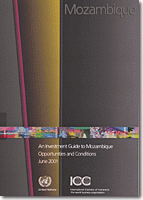
With a mostly poor population of 17 million, Mozambique´s market is small in itself. However, its integration into the Southern African Development Community (SADC) offers investors easier access to the main market in southern Africa. Agriculture (cashews, cotton, tobacco, sugar and other cash crops) and fishing and aquaculture (prawns and shrimp) are the backbone of the Mozambican economy. Investment opportunities are also available in the related agro-processing industries, especially in the southern region.
The liberal economic reforms pursued by the Government have laid the ground for profitable investment in a number of areas: cash crops, manufacturing, financial services, export processing (cashews, aluminium) and others. The traditional Mozambican role of providing its eastern and southern hinterland with access to seaports has given transport (rail, road, ports) and related services a central role in the economy, as is illustrated by the Maputo, Beira and Nacala corridors. Tourism, currently dominated by South African tour operators, is a sector with considerable potential.
An investor in Mozambique is, of course, faced with many bureaucratic and infrastructural hurdles. One major bottleneck for many investors, especially smaller ones, is the country´s limited administrative capacity. The labour law and the regulations concerning labour relations are an example of a major administrative hurdle for potential investors. The law on land tenure, which allows only a non-tradable lease for up to 50 years, is another example of how even a well-intended norm, adopted with the purpose of precluding speculation in land, can create a bottleneck. There is an abundant supply of poorly educated and untrained labour, but finding and retaining qualified personnel is a constant challenge.
| ||


